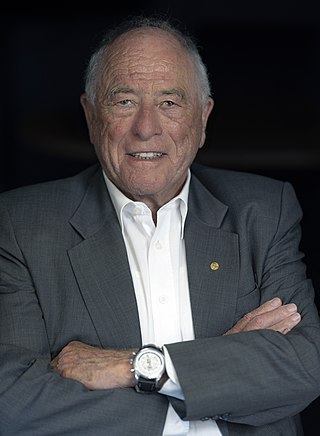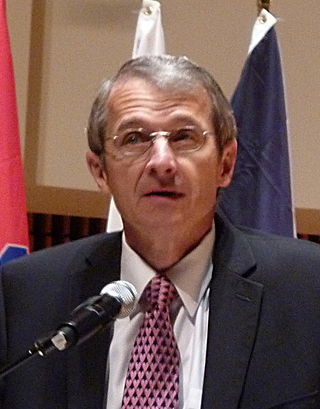Related Research Articles

Sir John Anthony Pople was a British theoretical chemist who was awarded the Nobel Prize in Chemistry with Walter Kohn in 1998 for his development of computational methods in quantum chemistry.

Kurt Wüthrich is a Swiss chemist/biophysicist and Nobel Chemistry laureate, known for developing nuclear magnetic resonance (NMR) methods for studying biological macromolecules.

Paul Christian Lauterbur was an American chemist who shared the Nobel Prize in Physiology or Medicine in 2003 with Peter Mansfield for his work which made the development of magnetic resonance imaging (MRI) possible.

The Wolf Prize is an international award granted in Israel, that has been presented most years since 1978 to living scientists and artists for "achievements in the interest of mankind and friendly relations among people ... irrespective of nationality, race, colour, religion, sex or political views."

The Mellon College of Science (MCS) is part of Carnegie Mellon University in Pittsburgh, Pennsylvania, US. The college is named for the Mellon family, founders of the Mellon Institute of Industrial Research, a predecessor of Carnegie Mellon University.

John Bennett Fenn was an American professor of analytical chemistry who was awarded a share of the Nobel Prize in Chemistry in 2002. Fenn shared half of the award with Koichi Tanaka for their work in mass spectrometry. The other half of the 2002 award went to Kurt Wüthrich. Fenn's contributions specifically related to the development of electrospray ionization, now a commonly used technique for large molecules and routine liquid chromatography-tandem mass spectrometry. Early in his career, Fenn did research in the field of jet propulsion at Project SQUID, and focused on molecular beam studies. Fenn finished his career with more than 100 publications, including one book.

John Bannister Goodenough was an American materials scientist, a solid-state physicist, and a Nobel laureate in chemistry. He was a professor of Mechanical, Materials Science, and Electrical Engineering at the University of Texas at Austin. He is widely credited with the identification and development of the lithium-ion battery, for developing the Goodenough–Kanamori rules in determining the sign of the magnetic superexchange in materials, and for seminal developments in computer random-access memory.

Richard Royce Schrock is an American chemist and Nobel laureate recognized for his contributions to the olefin metathesis reaction used in organic chemistry.

Martin Karplus is an Austrian and American theoretical chemist. He is the Director of the Biophysical Chemistry Laboratory, a joint laboratory between the French National Center for Scientific Research and the University of Strasbourg, France. He is also the Theodore William Richards Professor of Chemistry, emeritus at Harvard University. Karplus received the 2013 Nobel Prize in Chemistry, together with Michael Levitt and Arieh Warshel, for "the development of multiscale models for complex chemical systems".

Klaus Biemann was an Austrian-American professor of chemistry at the Massachusetts Institute of Technology. His work centered on structural analysis in organic and biochemistry. He has been called the "father of organic mass spectrometry" but was particularly noted for his role in advancing protein sequencing with tandem mass spectrometry following pioneering work conducted in this area by Michael Barber.

The President's Council of Advisors on Science and Technology (PCAST) is a council, chartered in each administration with a broad mandate to advise the president of the United States on science and technology. The current PCAST was established by Executive Order 13226 on September 30, 2001, by George W. Bush, was re-chartered by Barack Obama's April 21, 2010, Executive Order 13539, by Donald Trump's October 22, 2019, Executive Order 13895, and by Joe Biden's February 1, 2021, Executive Order 14007.
Fred Basolo was an American inorganic chemist. He received his Ph.D. at the University of Illinois at Urbana-Champaign in 1943, under Prof. John C. Bailar, Jr. Basolo spent his professional career at Northwestern University. He was a prolific contributor to the fields of coordination chemistry, organometallic, and bioinorganic chemistry, publishing over 400 papers. He supervised many Ph.D. students. With colleague Ralph Pearson, he co-authored the influential monograph "Mechanisms of Inorganic Reactions", which illuminated the importance of mechanisms involving coordination compounds. This work, which integrated concepts from ligand field theory and physical organic chemistry, signaled a shift from a highly descriptive nature of coordination chemistry to a more quantitative science.

Peter John Stang is a German American chemist and Distinguished Professor of chemistry at the University of Utah. He was the editor-in-chief of the Journal of the American Chemical Society from 2002 to 2020.

The American Institute of Chemists Gold Medal is the highest award of the American Institute of Chemists and has been awarded since 1926.
The Chemical Pioneer Award, established in 1966, is awarded by the American Institute of Chemists to recognize chemists or chemical engineers who have made outstanding contributions to advances in chemistry or the chemical profession.

Jerome A. Berson was an American chemist who was a Sterling Professor at Yale University, and also a published author. He worked on sigmatropic rearrangements, thermal and carbocationic rearrangements, and the role of orbital symmetry in chemical reactions while at University of Wisconsin. While at Yale University, he was part of many new studies, especially on non-Kekulé molecules.

Ralph Edward Oesper was an American chemist and historian of chemistry. He is noted for his biographies of scientists, emphasizing their personal lives in addition to their scientific contributions. Oesper translated significant works in the field of chemistry to various languages especially English. As an independent investigator, he developed improved analytical methods. These contributions included new reagents for certain types of titrations. One such new reagent, Oesper's Salt, is named for him.
William B. Jensen is an American chemist and chemical historian.
The Camille Dreyfus Teacher-Scholar Awards are awards given to early-career researchers in chemistry by The Camille and Henry Dreyfus Foundation, Inc. "to support the research and teaching careers of talented young faculty in the chemical sciences." The Dreyfus Teacher-Scholar program began in 1970. In 1994, the program was divided into two parallel awards: The Camille Dreyfus Teacher-Scholar Awards Program, aimed at research universities, and the Henry Dreyfus Teacher-Scholar Awards Program, directed at primarily undergraduate institutions. This list compiles all the pre-1994 Teacher-Scholars, and the subsequent Camille Dreyfus Teacher-Scholars.
Devarajan (Dave) Thirumalai, an Indian-born American physicist, is the Collie-Welch Reagents Professor in Chemistry at the University of Texas at Austin. His research spans equilibrium and non-equilibrium statistical mechanics, such as the transition from liquid to amorphous state, polymer-colloid interactions, and protein and RNA folding. He is known for his contributions to the theories of protein/RNA folding, protein aggregation, glasses, and biological machines. He also does research in intrinsically disordered proteins (IDPs), organization and dynamics of chromosome and cell biophysics. Prior to moving to the University of Texas at Austin, he was a distinguished university professor in the University of Maryland from 2010 to 2015.
References
- 1 2 Hutchins, Shana K. (October 22, 2015). "Texas A&M Chemist Earns ACS Oesper Award for Lifetime Accomplishment". Texas A&M University. Retrieved 8 March 2021.
- ↑ "Oesper History". University of Cincinnati. Retrieved 8 March 2021.
- 1 2 3 4 5 6 7 8 9 10 11 12 13 14 15 16 17 18 19 20 21 22 23 24 25 26 27 28 29 30 31 32 33 34 35 36 37 38 39 40 41 42 "Previous Recipients of the Oesper Award". University of Cincinnati. Retrieved 8 March 2021.
- ↑ "Peppas to Receive Prestigious Oesper Award in Honor of Contributions to Chemistry". University of Texas at Austin. November 3, 2020. Retrieved 8 March 2021.
- ↑ "News Archive for 2018". CINTACS. Retrieved 8 March 2021.
- ↑ "Platz Receives 2017 Oesper Award". The Ohio State University. September 6, 2017. Retrieved 8 March 2021.
- ↑ "Oesper Symposium and Award Banquet University of Cincinnati" (PDF). Cintacs. 52 (2). 2014. Retrieved 8 March 2021.
- ↑ Wang, Linda (December 9, 2013). "Richard Eisenberg Receives Oesper Award". C&EN. 91 (49). Retrieved 8 March 2021.
- ↑ "Kurt Wuthrich, PhD". Scripps Research. Retrieved 8 March 2021.
- ↑ Wang, Linda (September 14, 2009). "Susan Lindquist Is Oesper Awardee". C&EN. 87 (37). Retrieved 8 March 2021.
- ↑ Ray, Susan (May 11, 2008). "Marshall to receive Oesper Award" (PDF). State. No. 17. 42. Retrieved 8 March 2021.
- ↑ "NIH Scientist V. Adrian Parsegian Named to Gluckstern Professorship of Physics at UMass Amherst". University of Massachusetts Amherst. July 14, 2009. Retrieved 8 March 2021.
- ↑ "The 2003 Oesper Banquet and October Monthly Meeting Friday, Oct. 10, 2003" (PDF). Cintacs. 41 (1). 2003. Retrieved 8 March 2021.
- ↑ "The 2000 Ralph and Helen Oesper Awardee Honoring Mildred Cohn University of Pennsylvania School of Medicine" (PDF). 2000.
- ↑ "The 1999 Oesper Banquet and October Monthly Meeting, co-sponsored by the Department of Chemistry, University of Cincinnati honoring Professor George S. Hammond Bowling Green State University". Cintacs. 37 (2). 1999. Retrieved 8 March 2021.
- ↑ Gortler, Leon (21 March 2001). "Chemical Heritage Foundation Jerome A. Berson Transcript of an Interview" (PDF). Science History Institute. Retrieved 8 March 2021.
- ↑ "Finding Aid for the R.A. Marcus Papers 1951-2001". California Institute of Technology. Retrieved 8 March 2021.
- ↑ Kuwana, Ted (March 1, 2003). "Ralph N. Adams (1924–2002)". Analytical Chemistry: 96. doi: 10.1021/ac0312561 .
- ↑ Grayson, Michael A. (29 August 2006). "Chemical Heritage Foundation Klaus Biemann Transcript of an Interview" (PDF). Science History Institute. Retrieved 8 March 2021.
- ↑ "Stockmayer, Walter H., 1914-2004". Dartmouth Library Archives & Manuscripts. Retrieved 8 March 2021.
- ↑ Ley, SV (2002). "Sir Derek Harold Richard Barton 8 September 1918 — 16 March 1998". Biographical Memoirs of Fellows of the Royal Society. 48: 1–23. doi: 10.1098/rsbm.2002.0001 . S2CID 71981888.
- ↑ "Herbert C. Brown". Science History Institute. Retrieved 8 March 2021.
- ↑ "Finding Aid to the George C. Pimentel Papers, 1880-1990, bulk 1939-1990". Bancroft Library, UC Berkeley. Retrieved 8 March 2021.
- ↑ Ford, P. C. (2020). "Henry Taube, 30 November 1915 — 16 November 2005". Biographical Memoirs of Fellows of the Royal Society. 70: 409–418. doi: 10.1098/rsbm.2020.0042 . S2CID 227240673.
- ↑ "Fred W. McLafferty". Science History Institute. Retrieved 8 March 2021.
- ↑ "John A. Pople". IAQMS. Retrieved 8 March 2021.
- ↑ "Guide to the Fred Basolo (1920-2007) Papers 1941/2006". Northwestern University Library. Retrieved 8 March 2021.
- ↑ Kauffman, George B. "CALVIN, MELVIN". Encyclopedia.com. Retrieved 8 March 2021.